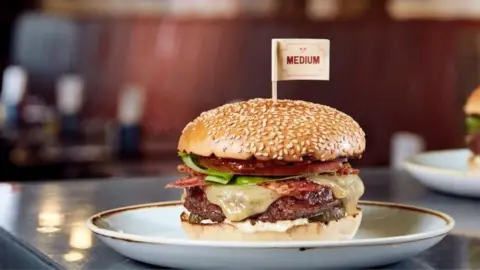Restaurant insolvencies jump as diners stay at home
 Gourmet Burger Kitchen
Gourmet Burger KitchenThe number of restaurant businesses becoming insolvent jumped by a quarter in 2018 as consumers shunned the High Street, new figures show.
Accountancy firm Moore Stephens said there had been 1,219 insolvencies, ranging from standalone restaurants up to large investor-backed chains - up from 985 in 2017.
It blamed overcapacity at a time when Britons are eating out less.
Restaurant critic Jay Rayner said more operators could struggle next year.
In 2018, a spate of big restaurant chains were forced to strike rescue deals - known as company voluntary arrangements (CVAs) - with their creditors as they faced unsustainable debts.
Gourmet Burger Kitchen earmarked 17 sites for closure while Carluccios is shutting 34 outlets. Prezzo said it would close 94 - about a third of the chain - including all 33 outlets of its Tex-Mex brand Chimichanga.
Moore Stephens said that insolvencies were at their highest level since it began tracking the sector in 2010.
It blamed an influx of private equity investment that had led to some restaurant chains opening too many sites that were now failing to break even.
It also said interest rate rises and Brexit concerns had "put a dent" consumer spending growth, as operators faced rising overheads such as the minimum wage and ingredient costs.
'Stalled'
Head of restructuring and insolvency Jeremy Willmont said: "Restaurants have always been prone to high failure rates but vacant restaurants used to be rapidly replaced by a new contender. For now, that process seemed to have stalled and many sites are empty.
"Under such tough trading conditions, restaurants should be cautious about building up debt. They can very quickly become overextended as costs continue to rise."
Restaurant critic Jay Rayner told the BBC that many restaurants - and particularly mid-market chains - operated on "extremely tight profit margins".
"They might be worth a lot but their margins are so tight that they are subject to real pain if there are sudden changes in the market place."
He said that while an independent, standalone restaurant might be able cut its costs and struggle on, investor-backed businesses had to cut their losses fast.
"I don't believe in crystal-ball gazing, but I think the last few months of the year will be good for restaurants, but in January many are going to find themselves staring down the barrel of Brexit.
"I think we could see a lot more businesses go to the wall and a lot of jobs lost."
